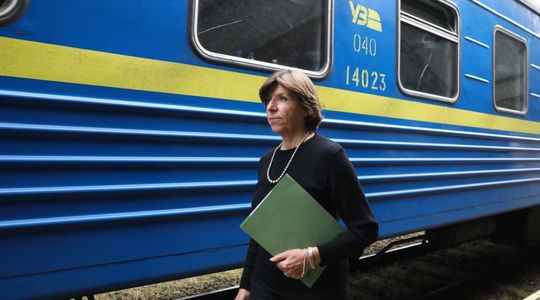The photo marks the first steps of Catherine Colonna at the helm of French diplomacy. Dressed all in black, the Minister of Foreign Affairs arrived in kyiv on Monday morning by a blue and yellow train – in the colors of the Ukrainian flag – from Poland. Like her American counterpart a month ago, she favored this means of transport “for security reasons”, indicates the Quai d’Orsay, which kept this trip secret until the last minute. This is the first visit by a French leader to the Ukrainian capital since the start of the Russian invasion on February 24. “It was high time! believes Michel Duclos, special adviser at the Montaigne Institute. An important symbolic gesture, at a time when the relationship between France and Ukraine has become strained. ground, perhaps to prepare the visit of President Macron”, specifies the diplomat, author of France in the upheaval of the world (The Observatory, 2021)
The choice of May 30 owes nothing to chance. A few hours before the European Council in Brussels, during which Ukrainian President Volodymyr Zelensky spoke to demand an embargo on Russian oil, Paris wanted to show its presence in kyiv.
“Since the start of the war, France has appeared as a second-tier player, slice François Heisbourg, adviser to the Foundation for Strategic Research. Emmanuel Macron was remarkable before the invasion, but today we are boxing far below of our capabilities. We are not acting as a country at the head of the presidency of the European Union, as a great military power, supposed to enjoy a certain diplomatic influence. We have no influence either in war (France contributes much less than others to arms deliveries), nor in peace.”
At the dawn of Emmanuel Macron’s second term, Catherine Colonna’s visit was certainly aimed at correcting the situation and putting some oil in the wheels with kyiv. In early May, Emmanuel Macron aroused the ire of Ukrainians by saying that “peace would not be built on the humiliation of Russia”. A few days later, its Minister Delegate for European Affairs, Clément Beaune, dashed the hopes of Ukraine’s accelerated accession to the European Union. It will take “probably 15 or 20 years” he declared, before recommending that kyiv integrate, in the meantime, the European political community proposed by President Macron.
On May 30, Catherine Colonna, a 66-year-old seasoned diplomat, accustomed to complicated bilateral relations after three years as ambassador to London in the midst of Brexit, was therefore on an “appeasement mission”. “There is nothing to defuse, we were assured Monday morning at the Quai d’Orsay. But the question of Ukraine’s membership will be on the agenda for discussions. Our main message is to reaffirm the support from France to Ukraine and to mark our desire to strengthen it on all fronts: humanitarian, economic, financial, and in terms of defense equipment.”
After a moment of meditation in Boutcha, on the outskirts of kyiv, to pay homage to the civilians massacred by the Russian forces during the first month of the invasion, the minister spoke with her counterpart, Dmytro Kuleba then with President Volodymyr Zelensky . In a joint press conference with Kuleba, she estimated at two billion dollars the total amount of aid already paid by France, on the military and humanitarian level, and promised increased support. The objective is to “make the price of the continuation of this aggression for Russia unsustainable”, declared Catherine Colonna. Regarding the application for EU membership, she assured that Paris was “favorable to a rapprochement with Ukraine and even an accelerated rapprochement”.
Will these statements be enough to reassure kyiv? Will they be able to give the Elysee Palace some influence over the Russian-Ukrainian dossier, as the 100th day of the war approaches? “Emmanuel Macron wants to hold his own line, without giving in to pressure” analyzes Michel Duclos. But to defend this “third way”, the Head of State took risks, and in the process lost part of his political capital with Zelensky. “He is not the only one, notes François Heisbourg. In reality, we are witnessing a triple absence: neither Emmanuel Macron, nor the German Chancellor Olaf Scholz, nor the President of the Italian Council Mario Draghi went to kyiv, when even the Spanish Prime Minister found the time to go, as did almost all the Heads of State and Government of the countries of Central and Eastern Europe.”
The French president, at the head of the Council of the EU until the end of June, does not have much time to turn the tide and show a strong Europe against Russia. Perhaps he dreams of coming to the Ukrainian capital flanked by his German and Italian counterparts? At the Quai d’Orsay, the secret remains jealously guarded. “The president will visit Ukraine when the time comes, we slip … and when his visit will be most useful.”
